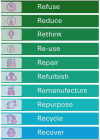Scoping review for the SAGES EAES joint collaborative on sustainability in surgical practice
- PMID: 39174709
- PMCID: PMC11458728
- DOI: 10.1007/s00464-024-11141-x
Scoping review for the SAGES EAES joint collaborative on sustainability in surgical practice
Abstract
Background: Surgical care in the operating room (OR) contributes one-third of the greenhouse gas (GHG) emissions in healthcare. The European Association of Endoscopic Surgery (EAES) and the Society of American Gastrointestinal and Endoscopic Surgeons (SAGES) initiated a joint Task Force to promote sustainability within minimally invasive gastrointestinal surgery.
Methods: A scoping review was conducted by searching MEDLINE via Ovid, Embase via Elsevier, Cochrane Central Register of Controlled Trials, and Scopus on August 25th, 2023 to identify articles reporting on the impact of gastrointestinal surgical care on the environment. The objectives were to establish the terminology, outcome measures, and scope associated with sustainable surgical practice. Quantitative data were summarized using descriptive statistics.
Results: We screened 22,439 articles to identify 85 articles relevant to anesthesia, general surgical practice, and gastrointestinal surgery. There were 58/85 (68.2%) cohort studies and 12/85 (14.1%) Life Cycle Assessment (LCA) studies. The most commonly measured outcomes were kilograms of carbon dioxide equivalents (kg CO2eq), cost of resource consumption in US dollars or euros, surgical waste in kg, water consumption in liters, and energy consumption in kilowatt-hours. Surgical waste production and the use of anesthetic gases were among the largest contributors to the climate impact of surgical practice. Educational initiatives to educate surgical staff on the climate impact of surgery, recycling programs, and strategies to restrict the use of noxious anesthetic gases had the highest impact in reducing the carbon footprint of surgical care. Establishing green teams with multidisciplinary champions is an effective strategy to initiate a sustainability program in gastrointestinal surgery.
Conclusion: This review establishes standard terminology and outcome measures used to define the environmental footprint of surgical practices. Impactful initiatives to achieve sustainability in surgical practice will require education and multidisciplinary collaborations among key stakeholders including surgeons, researchers, operating room staff, hospital managers, industry partners, and policymakers.
Keywords: Climate change; Greenhouse gas emissions; Minimally invasive surgery; Recycling; Surgical waste; Sustainability.
© 2024. The Author(s).
Conflict of interest statement
Patricia Sylla is a consultant for Ethicon, Safeheal, Tissium, and Stryker. Nader Francis has consulted for Medtronic, Olympus, Applied Medical, Pharmacosmos and Fisher & Paykel Healthcare. Robert Lim is a consultant for Up-to-date. Shaneeta Johnson is a consultant for Baxter and Intuitive Surgical. Yewande Alimi is a consultant for Medtronic. Sheetal Nijihawan is a consultant for Smart SurgN. Benjamin Miller has research funding from the American Hernia Society. Drs. Bright Huo, M.M.M. Eussen, Stefania Marconi, Wendelyn M. Oslock, Nana Marfo, Oleksii Potapov, Ricardo J. Bello, Jonathan Vandeberg, Ryan P. Hall, Adnan Alseidi, Manuel Sanchez-Casalongue, Andrea Pietrabissa, Alberto Arezzo, Maximos Frountzas, Vittoria Bellatot, Paul Barach, Miran Rems, Sheetal Nijihhawan, Tejas S. Sathe, Benjamin Miller, Sarah Samreen, Jimmy Chung, and N.D. Bouvy have no conflicts of interest to disclose.
Figures
References
-
- Costello A, Abbas M, Allen A, Ball S, Bell S, Bellamy R, Friel S, Groce N, Johnson A, Kett M, Lee M, Levy C, Maslin M, McCoy D, McGuire B, Montgomery H, Napier D, Pagel C, Patel J, de Oliveira JAP, Redclift N, Rees H, Rogger D, Scott J, Stephenson J, Twigg J, Wolff J, Patterson C (2009) Managing the health effects of climate change. Lancet and University College London Institute for Global Health Commission. The Lancet 373:1693–1733 - DOI - PubMed
-
- Kwakye G, Brat GA, Makary MA (2011) Green Surgical Practices for Health Care - PubMed
Publication types
MeSH terms
Substances
LinkOut - more resources
Full Text Sources
Research Materials






